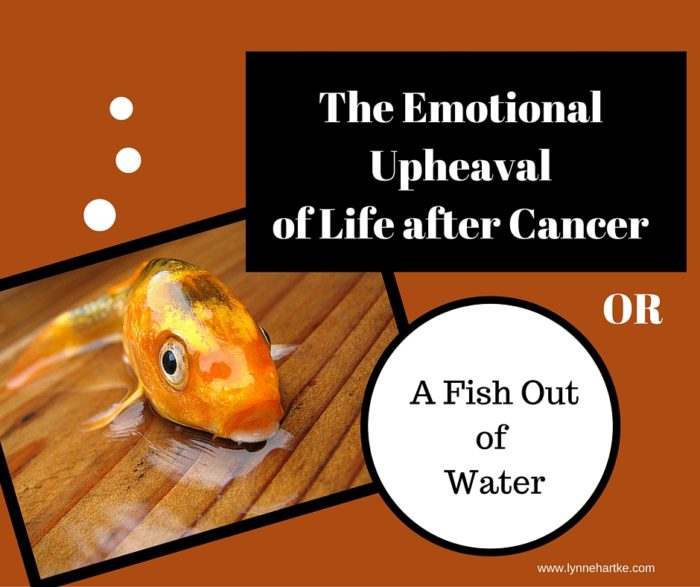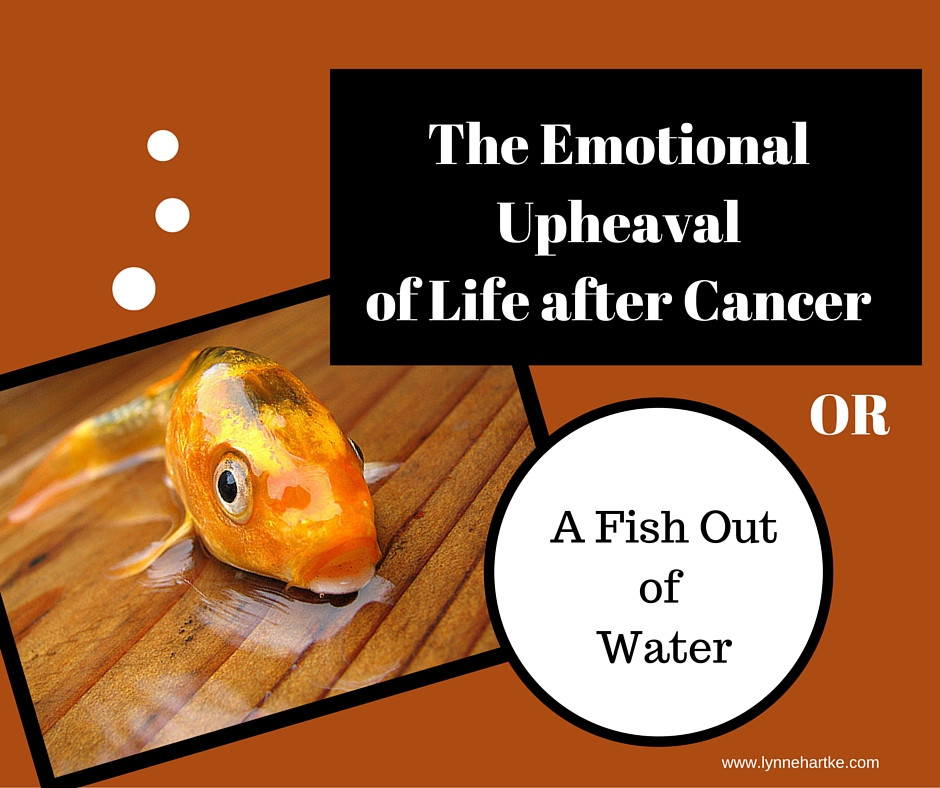After cancer treatment, many survivors feel like a fish out of water, on the outside looking in, with emotions all over the place. How do you fit into life again? This is the third in a series on Life After Cancer.

by Lynne Hartke
“I had a wedding to attend in Las Vegas,” Denise wrote when I asked her about the emotional changes and losses of life after cancer. “I was determined to attend. The wedding was for a daughter of a dear childhood friend. The date was circled, labeled and engraved in stone. The good news is that I made it to the wedding, but it was a challenge. Probably more mental, than physical. I had about 1/4 inch of hair, boyish looking and the ugliest slate-gray EVER since I wasn’t allowed to color it yet.”
“I found a dress; it was okay, but having lost ten pounds [from treatment], I just didn’t even feel like I looked good at all! At the reception, I can remember feeling like a ‘fish out of water.’”
“Truthfully, I am usually the one who gets the party started. It was hard for me to feel like that. I did end up dancing with my friends and tried to enjoy the celebration, but it felt so unnatural! My friend was so grateful. That helped me. Only a handful of people knew what I had been through and what a challenge even attending the wedding was. I tried to keep that perspective in mind.”
“I was a like a fish out of water,” Denise said. Other survivors I interviewed also talked about this sense of being on the “outside looking in” after they had finished treatment. Cancer came, causing a loss of certainty; turning goals, priorities and thoughts of the future upside down, and left a sense of “now what?”
Often when treatment is over, a sense of numbness remains, a sense of living beside life, but not really in it.
Now, the numbness doesn’t last and part of the healing that needs to happen after the physical trauma of cancer, is facing the emotional losses and changes — an entire roller coaster ride of them:
- anger and resentment
- depression
- embarrassment and shame
- fear
- gratitude and love
- guilt and blame
- joy and happiness
- sadness and grief
Lisa Hunter, one of the authors, in the book, Dancing in Limbo: Making Sense of Life After Cancer, writes, “When I returned to work and ‘normal’ life, I crashed. My work, my relationships, and my home were all the same, but I was different. I was worried, jumpy, forgetful, hopeless, and exhausted. I had always relied on my ability to organize things, but now everything seemed fragmented, disorganized, out of control. I was clinging to others and afraid of driving them away. My clarity was gone, and my brain felt as if someone had melted cheese over it.”
For many survivors, including myself, my focus was clear during treatment:
Defeat cancer.
- Kick that sucker in the teeth!
Now, seven years later, after the loss of both parents from cancer and finally done with treatment myself, I am still surprised at what gets stirred up from the depths.
Last week I returned, for the first time, to the area of the hospital where my mom had been admitted several times before her death 18 months ago. When I pulled into the parking lot, I found myself immediately dizzy and nauseated. I had gone to accompany a family member to an outpatient procedure and had no conscious thought about my past experiences in that place. Yet, suddenly all those powerful memories came flooding back with strange physical symptoms. I was totally unprepared!
This surfacing of emotion can take cancer survivors by surprise, especially when you expect (and others also expect of you) to be elated and happy that treatment is over. I know my experience in the hospital parking lot is part of the grief, the walking through the losses of cancer, as are the feelings mentioned by Denise and other survivors.
“Life goes on,” survivor Tina wrote. “Sort of. The biggest challenge I am still facing two years later is that life went on. I know this sounds a little egocentric, but it is still something we face. For two years, life was suspended for me. It was about rebuilding strength, building up my immune system, trying to get better and heal. It also meant surgeries, blood test and weekly doctor appointments. While I was suspended, my friends and family continued on.”
Part of the emotional healing of cancer, is acknowledging the emotional suspension, the emotional roller coaster, and the emotional losses. For many cancer survivors, the ability to look at the emotional upheaval only happens after they have the strength to look at it, sometimes months after treatment, but that can be difficult in a culture that doesn’t know how to handle “negative” emotion. Or you feel, or others feel, that you’ve passed the expiration date in regard to recovering from what you have experienced.
What do you do with the emotion? Do you acknowledge it? Stuff it down? Ignore it?
I have always tended to be on the stuffing side of things, but cancer seems to have taken the lid off my ability to do so any longer. Probably a good thing. I like how cancer survivor, Judy, was quoted in Dancing in Limbo, when asked if she felt sad, after treatment, for no apparent reason: “I felt a lot of sadness during the first year, but there was a very apparent reason.”
There was a very apparent reason for her sadness. There is a very apparent reason for your emotions also. You have experienced a traumatic event. And survived.
So What Do You Do with The Emotional Upheaval After Treatment of Cancer?
- When Necessary, Seek Professional Help.
Many cancer survivors struggle with depression and PTSD. If the emotions you face become too much, get the help you need. Seriously. I’m not going to write a lot about that here, because I am NOT qualified, but please listen to me when I tell you, “What you are experiencing is real and raw and messy. Don’t be afraid to seek help.”
- Tell Your Story.
Healing comes with the telling of your story. Again and Again. You probably need to tell it so many times that those closest to you will tire of hearing it. Okay, let’s be honest. They are probably sick of hearing about it. Join a support group. Your family will thank you. You will thank you. Surround yourself with others who share your story.
- Let the Emotion Drive You To God, Not Away from Him
I don’t know where we get the crazy idea that God only wants to see our happy emotions, that church is the place to attend when everything is going good. No. No. No. I can’t even tell you after thirty years of being a pastor’s wife, how many people disappear when the struggle is the greatest. And I get that. It was HARD for me to attend, and as a leader, to live out my loss on a visible platform, because like I said, cancer took my ability to stuff my emotions.
Run to God when everything is upside down and horrible and when you are the most afraid. My favorite verse is this, because it doesn’t put down my fear. “When I am afraid, I will put my trust in you” Psalm 56:3 NLT. When, not if.
Survivor Lori wrote that she still struggles with fear overwhelming her. “Choosing faith over fear is an ongoing life lesson for me, and it always seems to be the only lesson there is.”
Maybe fear will always be something we deal with and I’ve decided to be okay with that as long as the fear drives me toward God. Psychiatrist M. Scott Peck wrote, “The absence of fear is not courage; the absence of fear is some kind of brain damage. Courage is the capacity to go ahead in spite of the fear, or in spite of the pain.”
- Choose a Memory Stone
I have a container of stones on my desk from hikes with my husband. Each one is a physical remembrance of a specific adventure. Over my desk is a collection of items that remind me of my mom’s beauty and how she wore lipstick to fight cancer, including an art piece by my daughter. Both are visual positive reminders to me on hard days.
Survivor Marguerite has a strength necklace that she wore for five years during treatment as she prayed to God to give her strength for her journey. She still wears it during other difficult life situations. The necklace is a memory stone of God’s past faithfulness and a reminder to trust Him for strength in the Still Hard.
- Celebrate and Remember
Find an outlet to celebrate your journey. For me that meant surrounding myself with other survivors and getting involved in the cancer community.
After treatment, I tried to just pick up the pieces and return to “normal” life as if nothing had happened, making my survival just a tiny blip on the calendar of life. But surviving cancer IS A BIG DEAL! With the big deal of surviving, I want to recognize that means laughter and pain, sadness and love, grief and joy.
Surviving is a huge, important, complicated, sad, happy, the-rest-of-my-life, the-rest-of-your-life, wonderful, difficult experience. It’s a roller coaster ride, especially for a gal who gets sick on the merry-go-round, but worth every up and down bump of the journey.
What emotions were difficult for you?
Next week we will look at relationship challenges after cancer.



Beautiful. I am not the cancer survivor. I am the care giver. I too feel like a fish out of water. My life has forever been changed. Every emotion you’ve mentioned is evident in my life. Not to the extent of a survivor, but it is real. Somehow my loved one, the cancer patient, expects me to live like nothing has changed. EVERYTHING has changed, even our relationship. He wants no tears, no emotions. I’ve never been that person. So I cry alone, in my bed, in the car, in the shower. If one more person says to me that I am not the one with cancer, that I should be the Pollyanna, he wants me to be, I just may lose what remains of my filter. Cancer’s destruction is not confined to only the patient. It radiates through the entire family. My loved one will in all likelihood not be a survivor. Medically there is no hope or expectation of recovery or survival. Daily I watch as their life is slowly drained from their body. I can not be the same. God gives hope and comfort. But tears still come. Anger still raises its ugly head. Frustration still nags. Appetite still fades. My face and body have aged quickly and I am just the caregiver. I will be the one left alone. How does not start again is not really a question but rather a startling reality.